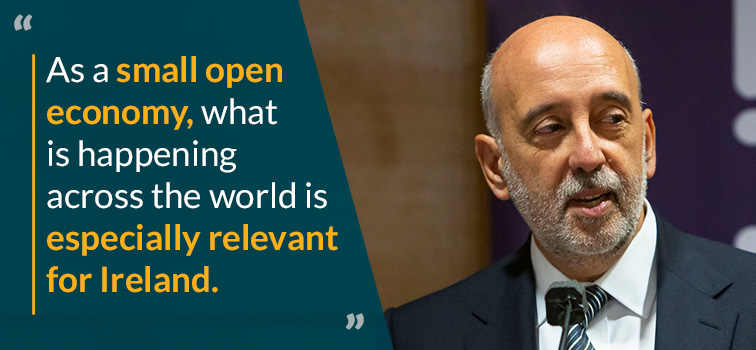Report from Washington
25 April 2024
Blog
 Last week I was in Washington DC, attending the International Monetary Fund and World Bank Spring Meetings (along with central banking colleagues, Ministers, civil society and business representatives and other officials from across the world). These gatherings – they happen every six months – are a valuable opportunity to share perspectives on global developments with a wide group of people. And as a small open economy, what is happening across the world is especially relevant for Ireland.
Last week I was in Washington DC, attending the International Monetary Fund and World Bank Spring Meetings (along with central banking colleagues, Ministers, civil society and business representatives and other officials from across the world). These gatherings – they happen every six months – are a valuable opportunity to share perspectives on global developments with a wide group of people. And as a small open economy, what is happening across the world is especially relevant for Ireland.
Since the last meeting (in Marrakesh) last October, the IMF has slightly revised its global growth forecasts upwards and assesses that economic activity was surprisingly resilient through the global disinflation of 2022-23. A soft landing for the global economy appears to be drawing closer although medium-term global growth prospects remain weak. As set out in the IMF’s Global Financial Stability Report, near term risks have receded as disinflation is entering its “last mile” but medium term vulnerabilities are mounting.
Some of the key themes discussed last week included:
- Returning inflation to target should remain a policy priority, and its persistence warrants caution, notwithstanding that the rate of inflation has fallen in most regions across the world;
- The diverging path that is emerging between advanced economies, and the extent that prospects for more subdued growth in China and other large emerging markets will weigh on trading partners. (Relatedly spillovers from G20 emerging markets was a feature of the IMFs World Economic Outlook.)
- The vulnerabilities and potential risks to financial stability from private credit. The IMF proposes a more proactive supervisory and regulatory approach to the sector, including closing data gaps and enhancing reporting requirements in order to assess risks more comprehensively;
- Cyber risk as a growing concern for macrofinancial stability. While cyber incidents have thus far not been systemic, the risk of extreme losses from such incidents has increased;
- While the global economic outlook is stabilising, fiscal policy continues to struggle with legacies of high debt and deficits. The IMF called for decisive fiscal consolidation efforts to safeguard sustainable finances, while protecting the most vulnerable;
- Reflecting on the above, the IMFC emphasised the importance of international cooperation to improve the resilience of the global economy and international monetary system.
The meetings also offer an excellent opportunity to build and strengthen bilateral relationships, especially with senior leaders in the IMF and colleagues from countries that are outside of the Eurosystem.
One of the topics of wider interest was the Central Bank’s work on the role that non-banks play in the financial system. History has shown the potential for certain cohorts within the funds sector globally to amplify adverse shocks: the COVID-induced market shock of March 2020, and the UK’s 2022 LDI issues being two obvious examples, and of course the lessons from the global financial crisis itself. Global coordination among central banks and securities markets regulators is critical so we can continue to make progress in addressing systemic risks from the non-bank sector, and I was delighted to participate in a joint IMF/IOSCO Conference on the issue. (On the topic of funds and systemic risk, we will be announcing our final macroprudential policy measures for sterling-denominated liability driven investment funds (LDIs) shortly, alongside colleagues from the CSSF in Luxembourg, reflecting the importance of international coordination in this area.)
Last week’s Meetings were set against a (continuing) global macroeconomic environment of financial market uncertainty, geopolitical tensions and regional conflicts. They reaffirmed for me the importance of strong international institutions in general (and the IMF/World Bank in particular) in addressing the (interconnected) challenges facing the world.
Gabriel Makhlouf